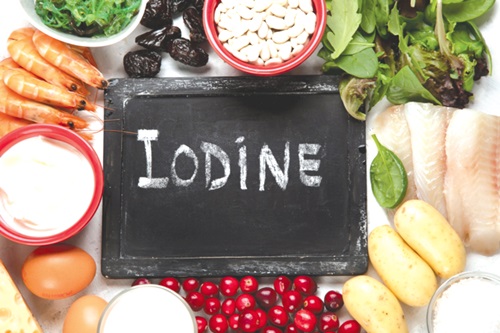It is a chemical element, symbolised as I, and with the atomic number 53.
It is a non-metallic halogen, crucial for human health as it is needed to produce thyroid hormones, which regulate metabolism and other bodily functions.
Iodine is naturally found in the earth, particularly in oceans, and is also added to some foods and supplements.
As an essential trace element, it is most commonly known for its role in thyroid function, but it also has properties that contribute to detoxification processes in the human body.
Neurological, hormonal balance
Low iodine levels can impair thyroid hormone production (T3 and T4), which are essential for brain development, energy metabolism and detoxification enzyme function.
Iodine has broad-spectrum antimicrobial action against bacteria, viruses, fungi and parasites.
Historically used as a topical antiseptic (like povidone-iodine), there's also evidence that oral iodine may support immune defence and reduce microbial burdens that otherwise tax the body's detox systems.
While not a primary antioxidant, iodine may help neutralise free radicals (especially in the thyroid gland) and support glutathione production (a major detox molecule).
This enhances the body’s ability to clear toxins and resist oxidative damage.
Iodine is powerful, but must be used cautiously.
The RDA dosage is ~150 mcg/day for adults.
Therapeutic doses can be much higher (e.g. 12.5 mg/day), but should be supervised.
High doses may trigger or worsen thyroid issues (hyper- or hypothyroidism), especially in people with autoimmune thyroiditis (e.g. Hashimoto’s).
When displacing bromide/fluoride, people may experience detox symptoms (fatigue, headache, skin issues).
Iodine, detoxicant
Iodine competes with other halogens in the body, such as fluoride, bromide and chlorine.
These halogens can bind to iodine receptors in the body and disrupt normal thyroid function and other metabolic processes.
Supplementing with iodine (especially in the form of nascent iodine or Lugol's iodine) may help displace toxic halogens and assist their excretion through urine and sweat.
Nascent iodine – atomic form, said to be easily absorbed and gentle.
Lugol’s solution – a mix of potassium iodide and elemental iodine (often used for higher-dose detox protocols).
Seaweed (e.g., kelp) – a natural source, but levels vary and may contain contaminants.
Replenishing iodine helps restore hormonal balance, indirectly supporting the liver and kidneys, the primary detox organs.
Liver, kidneys
The major detoxification pathways of the body include the liver, the kidneys, the lymph system, and the skin. Iodine is a major player in helping each one of these organ systems function at its best.
The lymph system: Iodine deficiency is a common cause of lymphatic congestion, according to Dr John Douillard, a global leader in the field of health and Ayurveda.
Liver: The thyroid and the liver are intricately connected, and iodine is key for communication between them.
The metabolic thyroid hormone thyroxine (T4) is comprised of four iodine molecules and is inactive when it is produced by the thyroid.
It must travel to the liver to be converted to its active form, triiodothyronine (T3).
When any of the components of this delicate process is off, the whole mechanism suffers, and so does your vital energy and overall health.
According to a 2002 British report, thyroid dysfunction may perturb liver function, liver disease modulates thyroid hormone metabolism, and a variety of systemic diseases affect both organs.
Kidneys: As with the liver, there is a delicate relationship between thyroid function and the kidneys, in large part mediated by iodine.
Several studies have established the link between kidney disease and thyroid malfunction.
Chronic kidney disease (CKD) is often characterised by low T3 production.
Hypothyroidism is also very common among CKD patients, according to a 2012 study published in the Indian Journal of Endocrinology and Metabolism.
Iodine supports detoxification by: Displacing toxic halogens (fluoride, bromide); supporting thyroid and hormonal health; aiding immune defence and reducing microbial toxins, acting as a mild antioxidant.
Always consult a healthcare provider before starting iodine supplementation, especially if you have thyroid issues or are taking medications.
The writer is a medical/science communicator.
E-mail: mustysallama@gmail.com

